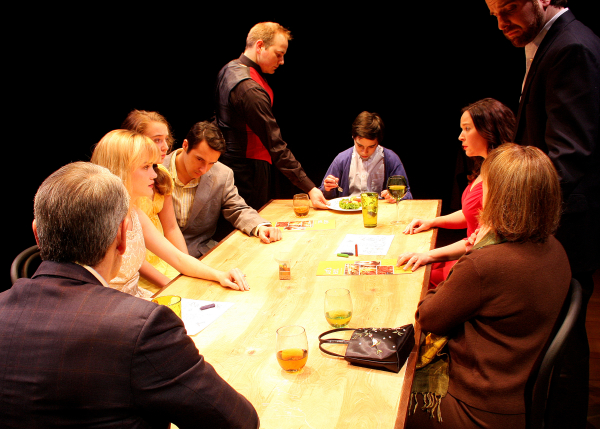The Big Meal

(© Richard Hall)
The life experiences that we share involve birth, death, taxes, and — if we are lucky — a good meal. Like playwrights Thornton Wilder in The Long Christmas Dinner and A.R. Gurney in The Dinner Party, Dan LeFranc has taken the forging of bonds around eating together to dramatize the stories of the multiple generations of one family in his episodic play, The Big Meal. Since LeFranc is writing in the 21st century, he seats the relatives around a table at the many chain restaurants that dot the land. When the waiter appears, he brings a ceremonial meal that serves as a harbinger of imminent death.
In the Zeitgeist Stage Company production, an ensemble of nine actors rotates in the roles of Sam and Nicole who meet-cute in a restaurant, fall in love, and get married. At first the dinners are for the two of them, but love and marriage are followed by the proverbial baby carriage, and they are joined by their children, Robbie and Maddy. Sam's parents arrive for a visit and his Dad makes embarrassing remarks, while Robbie and Maddy's behavior is the bratty-screechy kind that would often appall other diners. The children's sibling rivalry will remain an ongoing issue throughout the remainder of the 100-minute, intermission-less play.
The adult actors are divided into three age groups by couples: Devon Scalisi and Becca A. Lewis take on the middle-age roles of Sam and Nicole; Peter Brown and Shelley Brown, seen first as the grandparents, morph into Sam and Nicole when at old age. Johnny Quinones and Ashley Risteen play the characters as adolescents and first-time lovers. The impressive young actors, Arianna Reith, and high school student Alec Shirman, are cast as Maddy and Robbie, then transform into their progeny as the life cycle continues through the decades. Each pair of actors continues to trade roles (and change costumes) in round-robin sequence as the different characters mature. The tradeoffs by the actors are as compelling to watch as the tensions in the family which simmer and grow as time moves on.
Zeitgeist artistic director, David J. Miller, who staged the production, is a master at directing actors into an ensemble that makes the viewer believe in the stage truth of the characters and their interactions. Lewis, Peter Brown, Shelley Brown, and Risteen each deliver convincing and understated performances that add to the naturalistic tone. Lewis is memorable as the conflicted Nicole, beset by responsibilities and wracked by fears of Sam's infidelity in a marriage that endures nonetheless. She morphs into her equally complicated daughter, Maddy, who never seems to learn from her mistakes. The dignified Peter Brown works his way through a progression of older men, ending as Sam in the heartbreaking final stages of his life. Risteen is vibrant but admirably restrained as the party girl who is on the prowl for men. Shelley Brown as the old woman, Nicole, is left slumped alone in a chair at the table as the lights come down.
While there's a lifelike rhythm to the overlapping dialogue by the characters as they vie for attention, the recurring battles and competition become repetitive as the cycle continues, with the brief scenes coming on too rapidly to encompass the emotions they contain. The pileup of losses, both timely and unexpected, are signaled so often by the waiter, Josh Clary, that he becomes a comical figure rather than a dreaded apparition. LeFranc has tried to tie up each descendant's story, but has risked diminishing the sorrow we feel at losing them. While there are affecting scenes throughout the performance and the actors vary their characterizations, the point that life goes on despite the problems common to all of us is made long before the lights come down.











